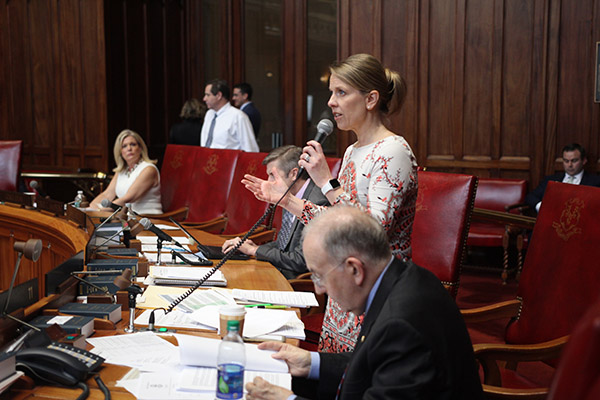Legislation to Establish Pilot Program for Cash Crop Which Will Help Connecticut’s Economy Passes State Senate

HARTFORD, CT – Today, the State Senate approved legislation which will create a hemp industry in Connecticut. The bill passed unanimously and State Senator Christine Cohen (D-Guilford), who is also co-chair of the Environment Committee, said this legislation will be incredibly advantageous to our states’ agriculture economy and farmers.
“This presents an exciting opportunity to grow business in our state in an incredibly lucrative industry,” said Sen. Cohen. “Many other states are already reaping the benefits of industrial hemp and I want Connecticut to realize all of that potential. Passing this legislation will create opportunities for new farmers; help farmers who are struggling, present seemingly endless manufacturing opportunities and strengthen our economy. We can no longer afford to sit on the sidelines and allow our state to miss out on this opportunity.
State Senators Norm Needleman (D-Essex) and Saud Anwar (D-South Windsor) applauded the passage of this legislation and agreed it will greatly benefit our state’s farmers and economy.
“I have already met with manufacturers and industrial leaders in my district who are thrilled at the prospect of working with hemp,” said Sen. Anwar. “The faster we can introduce hemp into our state, the better. Hemp won’t just provide a new crop for farmers, but it’ll give businesses everywhere new materials and resources they can use to directly help their bottom lines. I’m excited to see this legislation move forward.”
“Hemp has the potential to be a game-changer in Connecticut,” said Sen. Needleman. “Farmers will gain the opportunity to benefit from an entirely new, lucrative crop. Manufacturers and industries will have the chance to implement new materials and resources into their products. The state’s economy as a whole will likely benefit from its introduction to our state, and this legislation will push us closer to that goal.”
Senate Bill 893 will require the Department of Agriculture (DoAg) commissioner to adopt regulations establishing an industrial hemp pilot program in accordance with federal law. The pilot program will study the growth, cultivation and marketing of industrial hemp in Connecticut and ensure hemp growth and cultivation only takes place at sites certified by, and registered, with DoAg.
In 2014, Public Act 15-202 legalized an industrial hemp pilot program authorized under the 2014 farm bill. This legislation establishing a pilot program in Connecticut will jumpstart the process and positions our state to reap the benefits of industrial hemp as soon as possible.
This proposed bill has received support from the Connecticut Farm Bureau Association (CTFBA) as their former executive director, Bryan Hurlburt, provided testimony in favor of passing this bill. At the March 5 public hearing, Hurlburt testified that the legalization of industrial hemp in Connecticut would be “a lifeline for the agricultural economy, providing a much-needed cash crop to a market that is strapped for cash and markets.” The CTFBA estimated that an acre of hemp could generate 500 to 1,500 pounds of dried flowers per acre, generating gross revenues of $37,500 to $150,000 per acre. The Hemp Industries Association notes that U.S. retail sales of hemp products totaled nearly $700 million in 2016
“Industrial hemp will not only help our state’s farmers, but it will also create a new industry which has proven to be incredibly profitable in other states,” said Sen. Cohen. “This cash crop will provide for new business entry and pathways for existing businesses to grow. Additionally it will lead to the creation of jobs, thus strengthening our state’s economy.”
Hemp has been grown for centuries for use in clothes, paper, and rope. According to the Congressional Research Service, there are over 25,000 different uses for industrial hemp, including fibers, textiles, paper, construction and insulation materials, cosmetic products, animal feed, food and beverages and a local hemp industry would fulfill a demand for locally produced CBD oil. CBD is currently being used to alleviate some epileptic conditions and the FDA recently approved a new medicine, Epidiolex. The Connecticut Hemp Association estimates more than 100 Connecticut farmers are interested in planting hemp.
On March 8, this legislation passed the Environment Committee by a bipartisan and unanimous 28-0 vote. It now awaits further action by the State House of Representatives.
Share this page:
